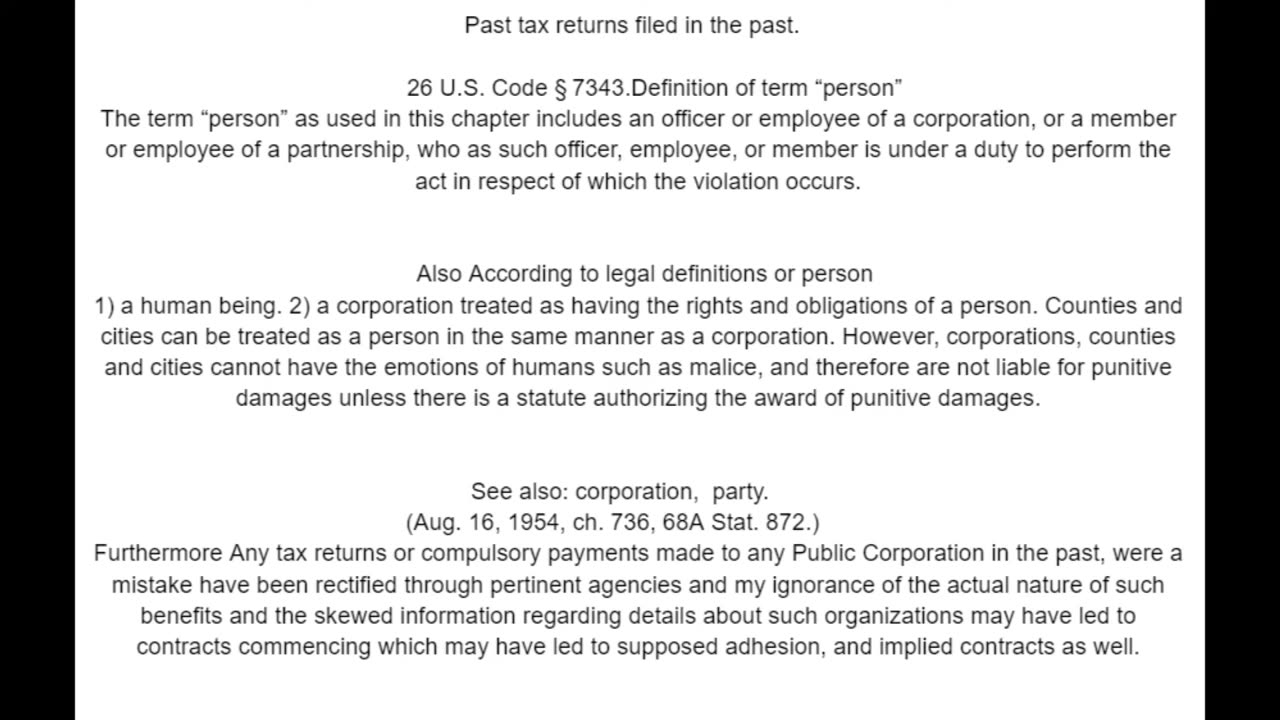Premium Only Content

What Is an Affidavit of Truth? and Affidavit Certificate? and Common Law Affidavit?
An affidavit of truth is a document in which an individual declares that he is a “sovereign citizen” and disavows the legal authority of federal, state, and municipal governments over him. The affidavit does not fit the traditional definition of an affidavit as “a sworn statement of facts used for legal purposes.” Rather, it represents a declaration of the individual’s political and legal beliefs. It is most often associated with the Sovereign Citizens Movement, and some of the beliefs of the movement are expressed in the affidavit.
The legal theory behind this document is based on sections of the US Constitution, which it interprets as limiting the powers of the federal government to US territories, military bases, and federal offices. The powers of state and municipal authorities are also rejected. The affidavit declares the signer of the affidavit, the “affiant,” to be a “sovereign citizen” and not a citizen of the US or subject to any of its laws except the Constitution as it applies to individuals.
The document further declares that the affiant is not an inhabitant of the US or its “ward” or “chattel.” The affiant also does not recognize any statutory law created by any legislature, but only the constitutional law. This declaration stems from the belief that all acts of US Congress and states applied to sovereign citizens are unconstitutional and therefore illegal. The affidavit revokes any “power of attorney” over the affiant claimed by the federal government regarding any Social Security number assigned to him.
There is also language in the affidavit of truth that the affiant does not recognize the legitimacy of any form of government benefits. Voting is not a privilege granted by the government but an inherent right of a sovereign individual. Voting is not an obligation, except when protesting the illegal basis of government in the US.
Concerning the jurisdiction of state and federal governments, an affidavit of truth lists certain actions of the affiant that are revoked or disavowed. Acquiescing in obtaining a driver’s license, voting, and registering children for public school are declared to have been performed under duress and to prevent government harassment. The document declares that any use of a bank account was out of necessity, because all banks are illegally regulated by the federal government, leaving no other alternatives. The affidavit disavows all these actions and states that they reflect no intent on the part of the affiant to submit to any form of governmental authority.
“Affidavit” and “certificate” have distinct meanings. When the words affidavit certificate are used together, often separated by a backslash mark, it is usually on a form requiring verification of statements already provided in the form, which only requires that basic information be filled in and the form be signed. In these instances, the terms affidavit and certificate are being used interchangeably. Sometimes there may be a certificate that indicates that an affidavit is part of a larger document or record, but an affidavit does not require a separate certificate to be valid.
The word “affidavit” is derived from a Latin expression “He has declared upon oath.” An affidavit is a sworn statement of facts that is signed by the person making the statement. This person is referred to as the “affiant” or sometimes the “deponent.” The body of an affidavit contains the name of the affiant and lists the facts or statements that are being made under oath. An introduction will indicate that the statement is being made under oath and the county and state in which the affidavit was prepared.
A notary or similar official witnesses the affiant sign the document and then signs and affixes a seal to the affidavit to verify that it has been appropriately witnessed and the date it was signed. Affidavits are primarily used in legal proceedings and can be entered into evidence in court. Knowingly putting false information in an affidavit can subject the affiant to the penalties for perjury.
An affidavit contains facts and information within the personal knowledge of the affiant and can concern a variety of topics. It can be about the affiant’s legal or marital status. It may be about specific occurrences regarding things like an automobile accident, or made to refute the statements of another person. Affidavits are often used when the affiant is not available to be a witness in court for health or other reasons.
The affidavit certificate is usually employed for administrative purposes to verify that a particular state of affairs exists. Like an affidavit, an affidavit certificate requires a signature and contains a warning that false or misleading statements may have certain legal consequences. For instance, parents sometimes are required to sign a form verifying that their child resides within the school district in which the child is registered. Applicants for government benefits may have to sign a form indicating that statements in the prepared form about their eligibility are correct. An affidavit certificate is different from an affidavit, in that it is not prepared by the person signing the document and is not notarized.
A common law affidavit is a written document that presents sworn statements offered under the penalties of perjury to establish the existence of a common law marriage. This type of affidavit is typically prepared to secure employment or beneficiary benefits for a live-in partner. It is presented to an employer or other authority in lieu of an official marriage certificate.
An affidavit is a legal document that is prepared by a witness to attest to facts of which the witness has personal knowledge. The document is signed under oath and in front of a notary or other officer of the court. Lies or misrepresentations made by affidavit are punishable in the same way as lying in court on a witness stand.
Marriage is a legal status between two people. It requires third parties to treat spouses as a single legal entity for purposes of taxes, benefits, or anything else that one spouse would be entitled to under the law. Couples who want to marry typically have to obtain a marriage license from the jurisdiction where they live and observe any other legal formality required by statute. Under ordinary circumstances, if two people are merely living together without meeting the legal formalities for a marriage, they are not married.
There is one exception, however. Common law marriage is a historical holdover under English common law that established marriage before the status was codified with specific legal requirements. A common law affidavit can be used to prove the existence of this type of marriage. Most jurisdictions recognize common law marriage as a substitute for formal marriage if certain living conventions are in place.
If one party to a common law marriage wants to obtain spousal benefits for a partner, a common law affidavit may be required to substantiate the relationship. The person providing the proof of the relationship has to sign a statement that typically states that the common law spouse is at least 18 years of age, is not a relative, and is not married to anyone else. The affidavit must establish that the couple has been living together for at least a year and are considered married by friends and family.
The common law affidavit must usually be accompanied by additional substantiation that proves the couple has been conducting themselves as if they were married. Satisfactory forms of proof are a joint mortgage, joint bank accounts, or filing joint taxes. If the partner is designated as a spousal beneficiary in a will, life insurance, or for any other retirement benefits, it will usually serve as satisfactory proof.
-
 27:25
27:25
What If Everything You Were Taught Was A Lie?
5 days agoYes Women Thrive On A Men’s Struggle In Life Schopenhauer’s Warning Women Are Not Pure Today
2.03K3 -

JdaDelete
15 hours agoBurning Rangers & Stellar-Fire | Sega Saturday
1.87K -
 2:36:02
2:36:02
I_Came_With_Fire_Podcast
15 hours agoSecret Origins of Transhumanism & The New Atlantis
21.8K15 -
 LIVE
LIVE
sophiesnazz
1 hour agoLETS TALK ABOUT BO7 !socials !specs
67 watching -
 LIVE
LIVE
MadHouseRetro
2 hours agoPUFFCO PIVIOT BUNDLE GIVEAWAY! and Spider-man 2 playthough!
64 watching -
 1:12:40
1:12:40
Wendy Bell Radio
12 hours agoPet Talk With The Pet Doc
54.2K32 -
 LIVE
LIVE
Biscotti-B23
1 hour ago🔴 LIVE TOURNAMENT PRACTICE ⚔ TOP 100 RANK 👑 DEMON SLAYER HINOKAMI CHRONICLES 2
35 watching -
 LIVE
LIVE
FusedAegisTV
16 hours agoStreet Fighter 6 FINALS, CS2 Semifinals | $1,250,000 | Riyadh, Saudi Arabia EWC 2025 !estv
105 watching -
 40:42
40:42
SouthernbelleReacts
1 day ago $0.10 earned😂 American Pie (1999) Reaction | Iconic Teen Comedy, High School Chaos & 90s Nostalgia 🥧
33.5K4 -
 5:05:02
5:05:02
LumpyPotatoX2
7 hours agoBecome a HellDiver Today - #RumbleGaming
47.8K1